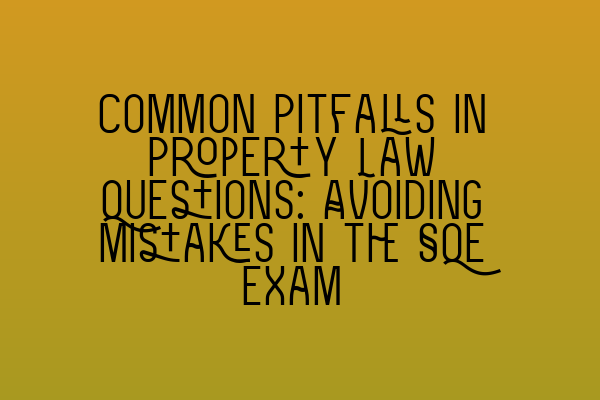Common Pitfalls in Property Law Questions: Avoiding Mistakes in the SQE Exam
Are you preparing for the SQE exam in property law? Are you worried about the common pitfalls that many candidates encounter in this subject? Don’t fret! In this blog post, we will discuss some of the most common mistakes made by candidates and provide you with valuable tips on how to avoid them. So, let’s delve into the world of property law and ensure your success in the SQE exam!
1. Misunderstanding key concepts
One of the most common pitfalls in property law questions is a lack of understanding of key concepts. It is crucial to have a solid grasp of the fundamental principles of property law, such as the distinction between real and personal property, the different types of estates, and the various interests that can exist in land. Make sure to thoroughly study and familiarize yourself with these concepts to avoid confusion during the exam.
2. Failing to read the question carefully
Another common mistake candidates make is rushing through the question without carefully reading and analyzing its requirements. Property law questions can often be complex and nuanced, requiring you to pay close attention to the details. Take your time to understand the scenario presented, identify the key issues, and formulate a well-reasoned response. Skipping this step can lead to incorrect answers and lost marks.
3. Neglecting case law and statutes
Property law is heavily influenced by case law and statutes. Failing to reference relevant cases or statutes in your answers is a significant pitfall. Remember, the examiners want to see that you understand how the law is applied in practice. Make sure to study landmark cases and relevant legislation, and be prepared to refer to them when appropriate.
4. Overcomplicating your answers
While property law can be complex, it is important not to overcomplicate your answers. The examiners are looking for clear, concise, and well-structured responses. Avoid using unnecessarily complex language or convoluted explanations. Instead, focus on presenting your analysis in a clear and logical manner. Remember, simplicity is key!
5. Neglecting practical application
Another pitfall to avoid is neglecting the practical application of property law principles. Property law is not just about understanding theoretical concepts; it also involves applying these concepts to real-world scenarios. In your exam answers, make sure to provide practical examples and demonstrate an understanding of how the law applies in different situations. This will showcase your ability to think critically and apply your knowledge effectively.
6. Insufficient preparation
Last but not least, insufficient preparation is a common pitfall that can hinder your success in the SQE exam. Studying for property law requires dedication, time, and effort. Make use of resources such as practice exams, mock quizzes, and preparation courses to enhance your knowledge and test your understanding. Utilize the related articles we have provided below for further assistance and practice.
Related Articles:
– SQE 1 Practice Exam Questions
– SQE 1 Practice Mocks FLK1 FLK2
– SQE 2 Preparation Courses
– SQE 1 Preparation Courses
– SRA SQE Exam Dates
In conclusion, avoiding common pitfalls in property law questions is crucial to achieve success in the SQE exam. By understanding key concepts, reading the questions carefully, referencing case law and statutes, providing clear and concise answers, applying your knowledge practically, and thoroughly preparing for the exam, you can enhance your chances of obtaining a favorable outcome. Best of luck with your studies and the upcoming exam!
